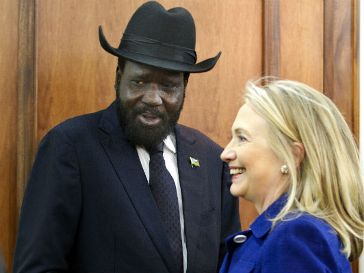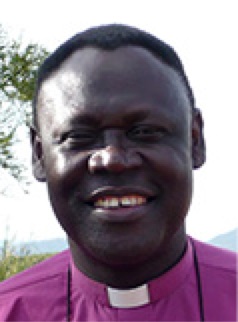Hillary Clinton discloses how she convinced Kiir to resolve Sudan oil dispute
June 11, 2014 (WASHINGTON) – Former United States secretary of state Hillary Clinton has disclosed in her newly published book released this week that she used an Op-ed by a South Sudanese bishop to convince president Salva Kiir to reach a compromise on the dispute with Sudan over oil transit fees.

Juba rejected Khartoum’s proposed fees for the service and called it excessive. The lingering disagreement prompted South Sudan to shut down its oil production in January 2012, accusing Sudan of stealing its oil and diverting it into other pipelines.
The shutdown was detrimental to both economies which rely on oil for the bulk of their revenues and hard currency inflows.
Clinton said in her book ‘Hard Choices’ that she pressed Kiir to reverse the decision during her meeting with him in the summer of 2012.
“So in August I flew to Juba, the new capital of South Sudan, to try to broker a deal. It had taken years of patient diplomacy to end the civil war and midwife the birth of a new nation, and we couldn’t let that achievement fall apart now. What’s more, with intense efforts under way around the world to convince energy-hungry nations to reduce consumption of Iranian oil and shift to new suppliers, we could ill afford to see Sudanese oil go off the market,” she wrote.
However, Kiir refused to budge, she said adding that the South Sudanese leader explained to her in length the reasons why his country could not compromise on an oil deal.
“Behind all the arguments about pricing and refining was a simple human reality: these battle-scarred freedom fighters couldn’t bring themselves to move beyond the horrors of the past,” Clinton wrote.
The then top US diplomat said the standoff between Khartoum and Juba “meant starving their new nation of the resources it needed to thrive”.

“Before we go any further, I would appreciate you reading this, I told him. President Kiir was curious; this was unusual behavior in a high-level diplomatic meeting. As he began to read, his eyes widened. Pointing to the byline, he said, “He was a soldier with me.” “Yes,” I replied, “but now he’s a man of peace. And he remembers that you fought together for freedom and dignity, not for oil.”
“There must always come a point,” Taban wrote, “where we look forward and recognise the need to stop fighting over past wrongs so we can build toward a new future.”
Clinton said that is “one of the hardest lessons for people to learn on any level, personal or political, but it is profoundly important in a world where so many societies are still held back by old enmities and conflicts”.
“I watched President Kiir read his old comrade’s words, and his defiance seemed to soften. Perhaps now we could get down to business. I kept emphasising that “a percentage of something is better than a percentage of nothing.”
“Finally president Kiir agreed to reopen negotiations with the North to try to find a compromise on oil pricing. At 2:45am. the next day, after a marathon negotiation in Ethiopia, the two sides reached a deal so that the oil could begin flowing again”.
Clinton gave extensive praise to Taban saying he is one of the “most remarkable” people she met mentioning that she held a meeting with him during that visit and invited him in September 2013 to the Clinton Global Initiative conference in New York where she presented him with Global Citizen award “for his peacemaking efforts”.
(ST)
